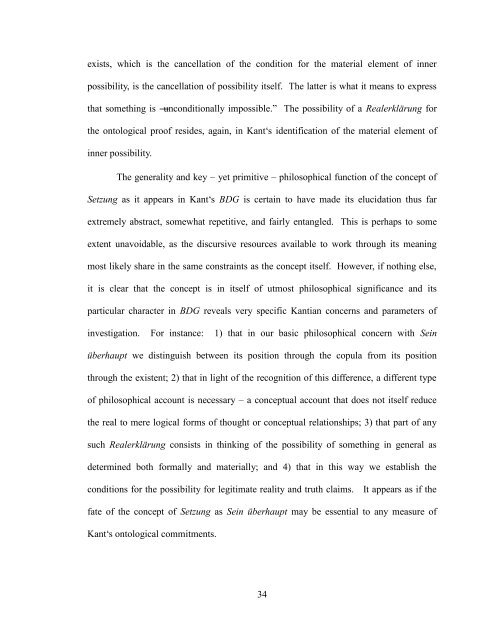The Doctrine of Self-positing and Receptivity in Kant's Late ...
The Doctrine of Self-positing and Receptivity in Kant's Late ...
The Doctrine of Self-positing and Receptivity in Kant's Late ...
You also want an ePaper? Increase the reach of your titles
YUMPU automatically turns print PDFs into web optimized ePapers that Google loves.
exists, which is the cancellation <strong>of</strong> the condition for the material element <strong>of</strong> <strong>in</strong>ner<br />
possibility, is the cancellation <strong>of</strong> possibility itself. <strong>The</strong> latter is what it means to express<br />
that someth<strong>in</strong>g is ―unconditionally impossible.‖ <strong>The</strong> possibility <strong>of</strong> a Realerklärung for<br />
the ontological pro<strong>of</strong> resides, aga<strong>in</strong>, <strong>in</strong> Kant‘s identification <strong>of</strong> the material element <strong>of</strong><br />
<strong>in</strong>ner possibility.<br />
<strong>The</strong> generality <strong>and</strong> key – yet primitive – philosophical function <strong>of</strong> the concept <strong>of</strong><br />
Setzung as it appears <strong>in</strong> Kant‘s BDG is certa<strong>in</strong> to have made its elucidation thus far<br />
extremely abstract, somewhat repetitive, <strong>and</strong> fairly entangled. This is perhaps to some<br />
extent unavoidable, as the discursive resources available to work through its mean<strong>in</strong>g<br />
most likely share <strong>in</strong> the same constra<strong>in</strong>ts as the concept itself. However, if noth<strong>in</strong>g else,<br />
it is clear that the concept is <strong>in</strong> itself <strong>of</strong> utmost philosophical significance <strong>and</strong> its<br />
particular character <strong>in</strong> BDG reveals very specific Kantian concerns <strong>and</strong> parameters <strong>of</strong><br />
<strong>in</strong>vestigation. For <strong>in</strong>stance: 1) that <strong>in</strong> our basic philosophical concern with Se<strong>in</strong><br />
überhaupt we dist<strong>in</strong>guish between its position through the copula from its position<br />
through the existent; 2) that <strong>in</strong> light <strong>of</strong> the recognition <strong>of</strong> this difference, a different type<br />
<strong>of</strong> philosophical account is necessary – a conceptual account that does not itself reduce<br />
the real to mere logical forms <strong>of</strong> thought or conceptual relationships; 3) that part <strong>of</strong> any<br />
such Realerklärung consists <strong>in</strong> th<strong>in</strong>k<strong>in</strong>g <strong>of</strong> the possibility <strong>of</strong> someth<strong>in</strong>g <strong>in</strong> general as<br />
determ<strong>in</strong>ed both formally <strong>and</strong> materially; <strong>and</strong> 4) that <strong>in</strong> this way we establish the<br />
conditions for the possibility for legitimate reality <strong>and</strong> truth claims. It appears as if the<br />
fate <strong>of</strong> the concept <strong>of</strong> Setzung as Se<strong>in</strong> überhaupt may be essential to any measure <strong>of</strong><br />
Kant‘s ontological commitments.<br />
34


